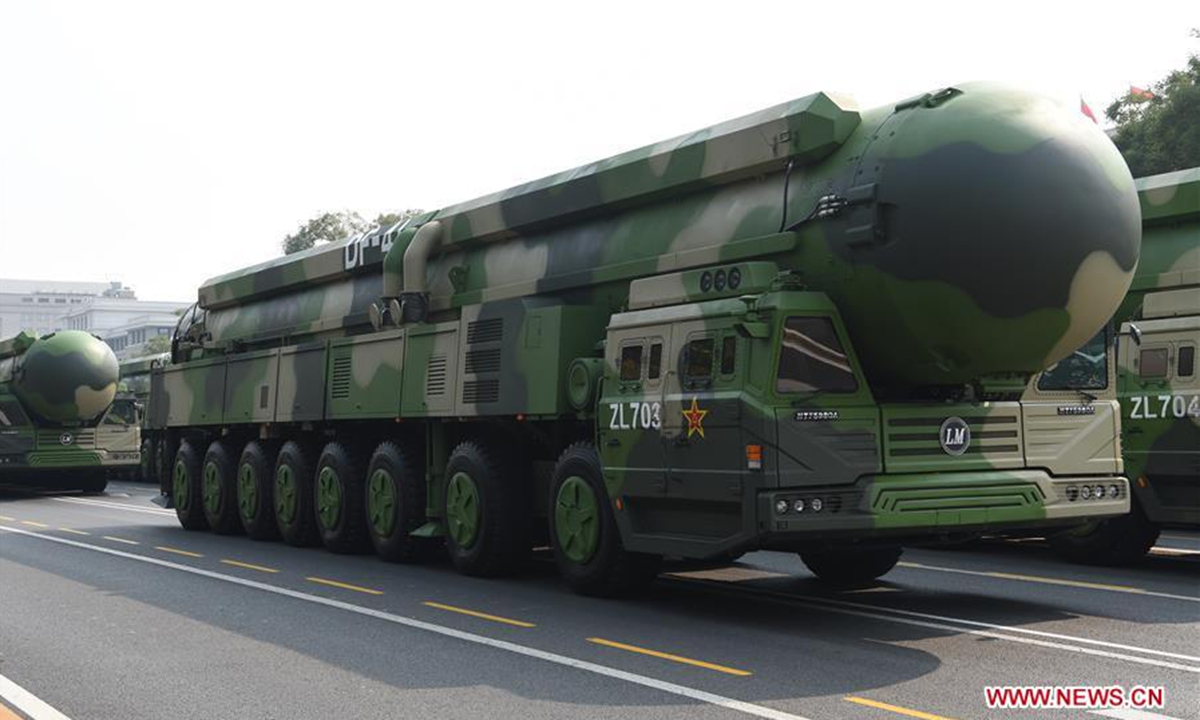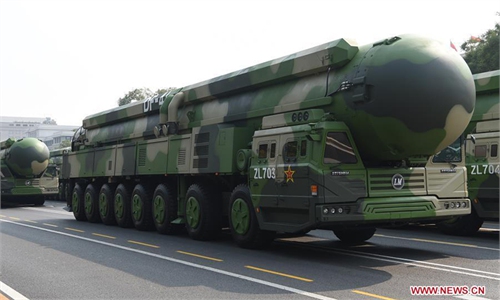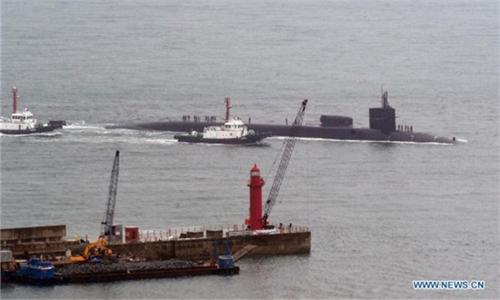US cannot dictate to China on nuclear arms control talks: Global Times editorial

The formation of Dongfeng-41 nuclear missiles takes part in a military parade celebrating the 70th anniversary of the founding of the People's Republic of China (PRC) in Beijing, capital of China, Oct. 1, 2019. (Xinhua/Xia Yifang)
Discussions about China's nuclear power have again emerged in Washington in the past two days. US National Security Advisor Jake Sullivan claimed that during the virtual summit between the Chinese and US heads of state, the two sides agreed to "look to begin to carry forward discussions on strategic stability." But he did not spell out what such discussions would be, and when they might be held. John Hyten, vice chairman of the Joint Chiefs of Staff, also made a sensational remark in an interview, saying Chinese could one day have the capability to launch a surprise nuclear attack on the US. He was referring to China's ability brought by the reported test of a hypersonic weapon.And that's not all.
Discussions on strategic stability used to refer to nuclear arms control talks. Yet in recent years, new categories such as cyber, space, and hypersonic weapons have been added to the concept. Its connotation has expanded. The readout of Chinese side on the China-US virtual summit did not touch on discussions on strategic stability, nor did the US' official readout. It can thus be concluded that the leaders of the two countries must have not reached a clear conclusion on this issue, which, so far, remains vague.
The US strongly wants to draw China into nuclear arms control negotiations. During Donald Trump's presidency, Washington wanted Beijing to join the US-Russian arms control talks, but China refused. The nuclear deterrence of China is not at the same level as that of the US and Russia. China's attitude has strong moral and reality bases, and the US cannot exert any coercive force.
This year, the US has been continuously claiming that China built multiple nuclear missile silos based on commercial satellite images, claiming China's nuclear expansion is "suffocating." The Pentagon's report on China's military, issued last month, predicts that China could have 1,000 nuclear warheads by 2030. The hype, combined with the so-called hypersonic missile test, which is not officially confirmed by China, have created an unprecedented atmosphere of panic toward the development of China's nuclear deterrence.
US media quickly amplified the vague information from Sullivan, and claimed it was "one of the few specific items announced so far that the two sides would need to follow up on" during the virtual summit. They did it on purpose, hoping to promote public opinion pressure to make China accept that it is already a fait accompli - nuclear arms control discussions have been listed in the China-US agenda.
An anonymous Chinese official told a foreign media outlet that discussions on nuclear arms control between China and the US could first be carried out through scholars, or what is commonly referred to as "track two" talks. Global Times has learned that there have been many "track two" talks between China and the US on the nuclear issue.
We noted that some Western scholars have expressed doubts about the possibility of China and the US holding talks on nuclear arms control in the near future. The reason is that China and the US have deep distrust in each other on strategic issues and the gap between the size of their nuclear deterrence is so wide that they do not believe China has the impetus to do so.
The Global Times believes that conditions for China and the US to carry out "track one" nuclear arms control talks (referring to the talks between the functional departments of the two countries) are not yet available. The US hopes that its absolute nuclear superiority over China will be solidified thoroughly and will take it as the ultimate bargaining chip to put strategic pressure on China. Its anxiety over China's nuclear deterrence reflects its zero-sum mentality in its China policy. The US has been increasing its sense of urgency for dynamic assessment of China's minimum nuclear force needed to maintain security.
China has no intention to engage in a nuclear arms race with the US. What we need to establish is a fully effective nuclear deterrence to exclude the possibility of the US exercising nuclear blackmail against China at a critical moment. Tensions are high across the Taiwan Straits. The DPP authority is crazily rejecting reunification by force and seeking "independence" by relying on the US. There is a serious possibility of a war across the Taiwan Straits, and the US has been implying a possible military intervention from time to time. Several recent literary deductions on the China-US conflict have predicted that the US would be the first to launch a nuclear attack on China.
The US must reduce the strategic threat it imposes on China, excluding the possibility of imposing military pressure during process of Chinese mainland solving the Taiwan question. It must make sure that it will not take extreme action to interrupt the development of China, so Chinese society can clearly see that the hostility from the US toward China is decreasing. These are all preconditions for the US to have nuclear arms control talks with China.
When the Taiwan question is resolved and the US truly accepts China's rise instead of threatening China's core interests, China's strategic need to strengthen national security through increased nuclear deterrence would be greatly reduced. Having talks on nuclear security requires efforts in multiple dimensions.


